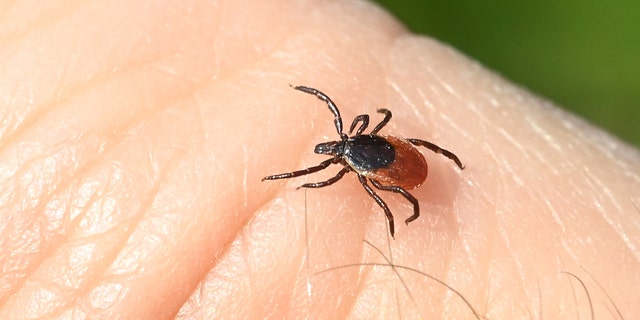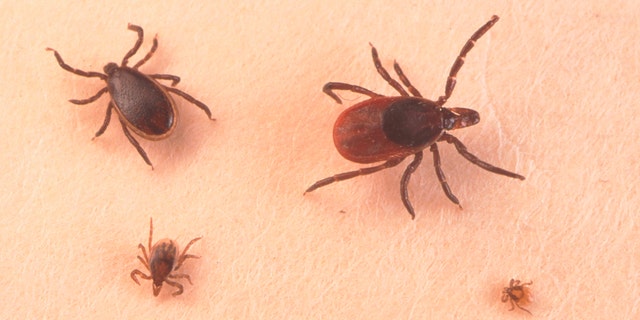When Americans spend time in the great outdoors this summer, they don’t want to come back home with any uninvited guests.
Lyme disease, the most common tick-borne disease in the United States, can have severe complications if left untreated or unnoticed.
Prompt treatment is essential to prevent the spread of the disease elsewhere in the body.
TICK BITES AND LYME DISEASE: WHAT TO DO IF A TICK BITES YOU OR YOUR PET
Yet the current recommended laboratory test to diagnose Lyme disease misses many early cases.
Now, a Virginia Tech research team is developing a promising at-home test that can diagnose the illness within hours of transmission, according to a recent report.
Lyme disease is caused by a bacterium known as Borrelia burgdorferi and rarely, borrelia mayonii, which is transmitted to humans after an infected blacklegged tick bites them, per the Centers for Disease Control and Prevention (CDC).
“The only FDA-approved diagnostic for Lyme disease measures antibodies against Borrelia burgdorferi, not the presence of the bacterium itself,” Linda Giampa, executive director of the Bay Area Lyme Foundation in San Francisco, California, told Fox News Digital.
“Lyme disease has been commonly misdiagnosed by unreliable tests for far too long.”
“It misses up to 60% of acute cases of Lyme, as it takes several weeks for these antibodies to rise to detectable levels in people,” she added.
TICK BITES ON THE RISE: HOW TO STAY SAFE AS YOU HEAD OUTDOORS
“Lyme disease has been commonly misdiagnosed by unreliable tests for far too long, and there are currently no reputable at-home tests on the market,” she also said.
Symptoms may mimic the flu
Some 35,000 cases of Lyme disease are reported to the CDC every year, but the number of cases is grossly underreported — with insurance records estimating the true annual number around 476,000, according to experts.
The infection was named where it was first discovered: Lyme, Connecticut.

Within several days to one month after a tick bite, someone may experience symptoms that could mimic the flu, such as fever, chills, muscle and joint aches, per the CDC.
In 70-80% of cases, a classically non-itchy rash that resembles a “bull’s-eye” develops at the site of the bite, often within a week of the infection, the agency added.
Prompt treatment helps decrease signs and symptoms of the disease and prevents spread to later stages of illness.
In later stages of the disease, such as days to months after the tick bite, untreated Lyme disease can spread to other parts of the body in about 60% of the patients.
Prompt treatment helps decrease signs and symptoms of the disease and prevents spread to later stages of illness.
DEBBIE GIBSON SPILLS HER SECRET TO STAYING FIT AMID STRUGGLES WITH LYME DISEASE
Diagnosis relies on the body’s immune response to the Lyme bacteria because it’s very difficult to culture the bacteria directly in lab.

“This requires both a healthy immune system and time to produce a robust enough response that can be detected (i.e., anti-B. burgdorferi titer),” Dr. Brandon Jutras, associate professor in the department of biochemistry and a member of the Fralin Life Sciences Institute at Virginia Tech in Blacksburg, Virginia, told Fox News Digital via email.
At-home test directly detects bacteria
Last year, the U.S. Department of Health and Human Services, in partnership with the Steven and Alexandra Cohen Foundation, a nonprofit to advance research of Lyme disease, initiated a competition known as the LymeX Diagnostics Prize.
The Jutras team at Virginia Tech is focusing on a component in the cell wall that’s unique to the bacteria that cause the disease.
The goal was to inspire researchers to develop better diagnostic tests to detect active Lyme disease infections in people more accurately.
There are 10 teams competing in the second round, including the team at Virginia Tech.

“Among the promising diagnostics supported by the LymeX Diagnostics Prize are at-home tests, which are being developed by a research group at Virginia Tech to enable direct detection of the Lyme disease bacterium within hours of transmission,” Giampa noted.
The Jutras team is focusing on a component in the cell wall that’s unique to the bacteria that cause the disease.
There are hopes the team’s work “will lead to a rapid, specific test that doesn’t rely on a patient response.”
“Virtually all bacteria have layer(s) of peptidoglycan, and many of the components that make up peptidoglycan are highly similar,” Jutras told Fox News Digital.
AI TECH AIMS TO HELP PATIENTS CATCH DISEASE EARLY, EVEN ‘REVERSE THEIR BIOLOGICAL AGE’
“As it turns out, the peptidoglycan from the bacterium that causes Lyme disease is vastly different.”
As the bacteria grow, they shed these unique pieces of their peptidoglycan that are highly abundant — which makes it a “perfect biomarker for diagnostics,” he added.

“We have created several monoclonal antibodies that are capable of specifically detecting the peptidoglycan pieces,” he said.
Antibodies to the Lyme bacteria can linger for months, he said.
So it’s not always clear from the current recommended testing available if the patient has an active infection — or was infected in the past.
Although it will be likely several years before his test may be ready for use, “our approach would, in theory, work immediately after transmission because as long as the bacterium is replicating, [it is] shedding peptidoglycan,” he said.
It will be likely several years before this test may be ready for use.
“This is a basic feature of this unusual organism,” he added.
“Our test exploits this process,” he said — noting that he hopes it “will lead to a rapid, specific test that doesn’t rely on a patient response.”
LymeX Diagnostic Prize officials note on the competition’s website, “As the geographic range of ticks, mosquitoes, and fleas that can transmit pathogens and cause disease expands within the United States, the need for diagnostic innovation will only become more urgent.”
CLICK HERE TO SIGN UP FOR OUR HEALTH NEWSLETTER
Jutras also said, as noted on that site, that he hopes long term, “we can do exactly what happened with COVID-19 and turn it into an at-home test. You wouldn’t be able to do a blood test; that’s not safe. But where we would optimize this is the urine test.”
Read the full article here